
GANGS selling dodgy, dangerous seafood door to door are targeting pensioners, according to police.
Inspector John Graham of Police Scotland’s Safer Communities scheme said: “These scammers target the older and more vulnerable members of our communities, offering fish for sale which is of poor quality, not stored properly, and at inflated prices, using pressure techniques on the doorstep.
“We work closely with Trading Standards and with other partners to set up cold calling zones, run operations to target these criminals, and promote awareness campaigns to help communities help themselves.”
Typically, victims are being “cold called” by men selling fish – usually chilled, not frozen – and sold under the guise of being ready for the freezer.
The conmen use high pressure sale tactics and have bullied at least one individual into spending nearly £700.
Sales can be of excessive quantities of often mislabelled and rotting fish so the harm doesn’t necessarily stop at financial loss.
The rogues are often keen to keep consumers away from the van where the fish is stored and police advise people not to agree to a sale until the conditions of the vehicle where fish is being sold has been checked out.
Dodgy alcohol sold at knock down prices and even suspect meat in takeaways are all on the radar of authorities.
Ron McNaughton, head of the Scottish Food Crime and Incidents Unit at Food Standards Scotland, said: “Those who participate in food fraud have a complete disregard for the public they’re selling to.
“The Scottish Food Crime and Incidents Unit is committed to working with local authorities and the police to prevent and detect food fraud.
“We can also be sold food that is not what it says it is, such as the substitution of almond powder for peanut powder, or the substitution of lamb for a less expensive meat in a takeaway meal.”
Any suspicious activity can be reported anonymously through the Scottish Food Crime Hotline on 0800 028 7926, or by calling Police Scotland’s non-emergency number, 101.

Enjoy the convenience of having The Sunday Post delivered as a digital ePaper straight to your smartphone, tablet or computer.
Subscribe for only £5.49 a month and enjoy all the benefits of the printed paper as a digital replica.
Subscribe